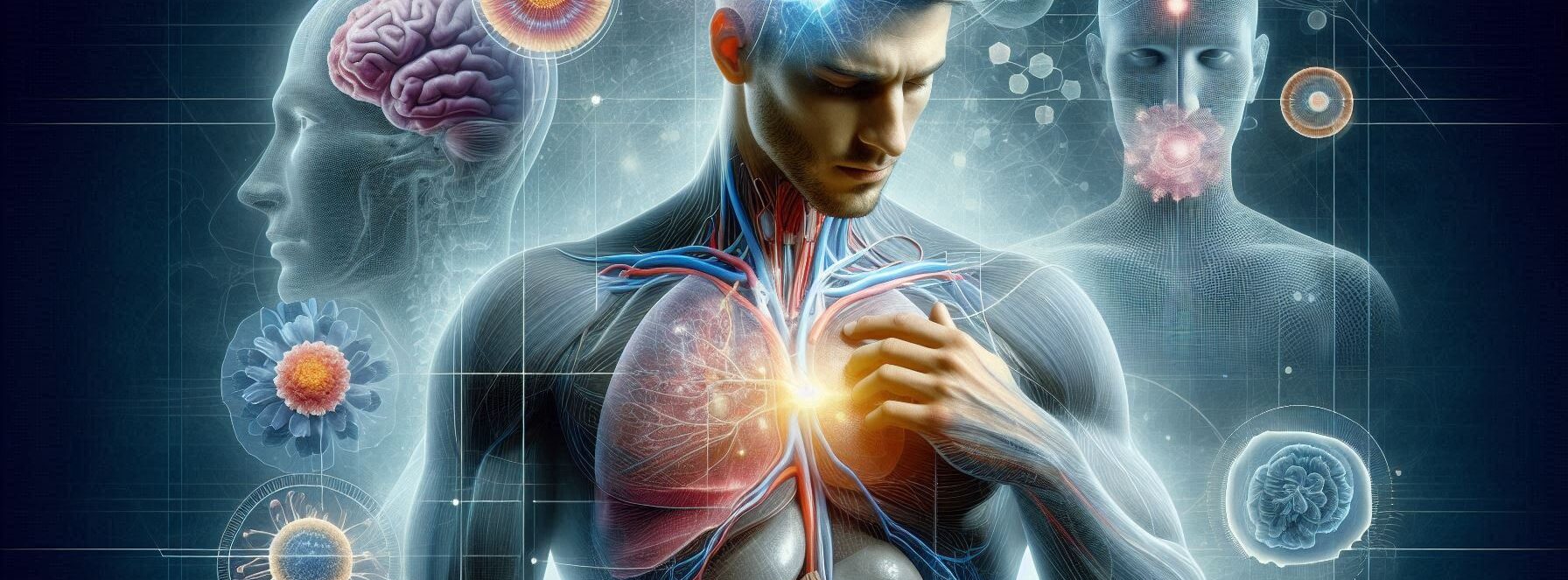It’s not simply having a terrible day or being unhappy; it’s like being stuck in a fog that won’t go away. You know how some days it feels like climbing Mount Everest to get out of bed? Yes, that’s part of it. I recall asking myself, “Why can’t I just get over this?” But the first step to getting back to better days is to understand depression. Let’s delve into this topic together! Grab your favorite warm blanket.
Top Takeaways and Key Concepts
- Understand depression types: Recognize major, persistent, and seasonal depressive disorders.
- Identify causes: Consider genetics, trauma, life events, hormones, and environment.
- Spot symptoms early: Look for sleep changes, low energy, and lost interest.
- Seek support: Talk to friends, family, or mental health professionals.
- Use coping strategies: Exercise, nature walks, dance, mindfulness, and creative expression.
Summary:
The text provides a comprehensive guide to understanding depression, covering its types, causes, symptoms, and coping strategies. Major depressive disorder, persistent depressive disorder, and seasonal affective disorder each affect daily life differently, making awareness crucial. Causes include genetics, life events, trauma, and hormonal changes, while symptoms range from sleep disturbances to loss of interest and persistent fatigue. Seeking support from friends, family, therapists, or support groups is essential for recovery. Practical coping strategies such as exercise, dancing, spending time in nature, mindfulness practices, and creative expression can improve mood and mental well-being, highlighting that small, consistent actions contribute to managing depression effectively.
What is Depression?

Please Note: This post may contain affiliate links. If you click one of them, we may receive a commission at no extra cost to you. As an Amazon Associate, I earn from qualifying purchases.
Did you know that the average person spends about 20 years of their life sleeping? That’s enough time to dream up some pretty bizarre scenarios, like being chased by giant marshmallows or having a tea party with talking cats. While sleep is essential for mental health, it can also be a place where our minds wrestle with depression in strange ways!
“Depression is not a sign of weakness. It means you have been strong for too long.” – Anonymous
Depression is more than just a short-lived sense of despair. It impacts how you think, feel, and do everyday things in a complicated way. If you’ve ever felt like you had an invisible bag full of bricks on your back, you probably know what depression feels like. Symptoms can include feeling unhappy and hopeless all the time, being irritable and tired, or feeling like you’re living in slow motion while everyone else zooms by.
There are also numerous kinds of depression. People frequently think of major depressive disorder as the worst kind of depression. It hits hard and often needs expert care. Imagine this: you wake up one day and feel like a heavy blanket has been placed over everything in your life. It seems like everything is gray, and even the idea of getting out of bed feels huge. This type can happen in episodes that continue for weeks or months, which makes it hard to do routine things. It’s not just being sad; it’s a heavy mood that affects every part of your life.
Unpacking Depression: A Few Surprising Insights
– Brain Freeze, Literally: When you feel depressed, your brain can act like a computer that’s overloaded. It can take longer to process information, making you feel slow and foggy. So, if you’re having trouble remembering where you left your keys, it might just be your brain saying, “Help! Too much going on!”
– Sadness Can Be Contagious: Ever notice how hanging out with a grumpy friend can bring you down? Research shows emotions can spread between people like a sneeze! So next time you’re around someone who’s a real downer, maybe consider wearing an emotional mask.
– The Color of Your Mood: Did you know that blue is often linked to feelings of sadness? But here’s the twist—many people also find comfort in the color blue! It’s like your brain is saying, “I’m sad but at least I look good while I’m at it!”
Then there’s persistent depressive disorder (dysthymia), which lingers for years but isn’t always as severe. Imagine carrying around a small, annoying pebble in your shoe—it’s not going to break your foot, but boy, does it make walking uncomfortable! People with dysthymia may experience low mood for long stretches of time—often two years or more—without necessarily hitting rock bottom like those with major depression. They might have days where they feel okay-ish, but overall, there’s a constant cloud hovering above them. The tricky part? Many don’t even realize they’re dealing with depression because they’ve gotten so used to living with that pebble.
And let’s not forget seasonal affective disorder (SAD), which makes you want to hibernate during the winter months—kind of like a bear but without all the fur! If you’ve ever felt inexplicably down when daylight savings kicks in and the sun starts playing hide-and-seek, you might be familiar with SAD. It typically surfaces when days get shorter and colder; symptoms can include fatigue, social withdrawal, and changes in sleep patterns or appetite—like suddenly craving all things cozy and carb-filled while binge-watching your favorite shows under a pile of blankets.
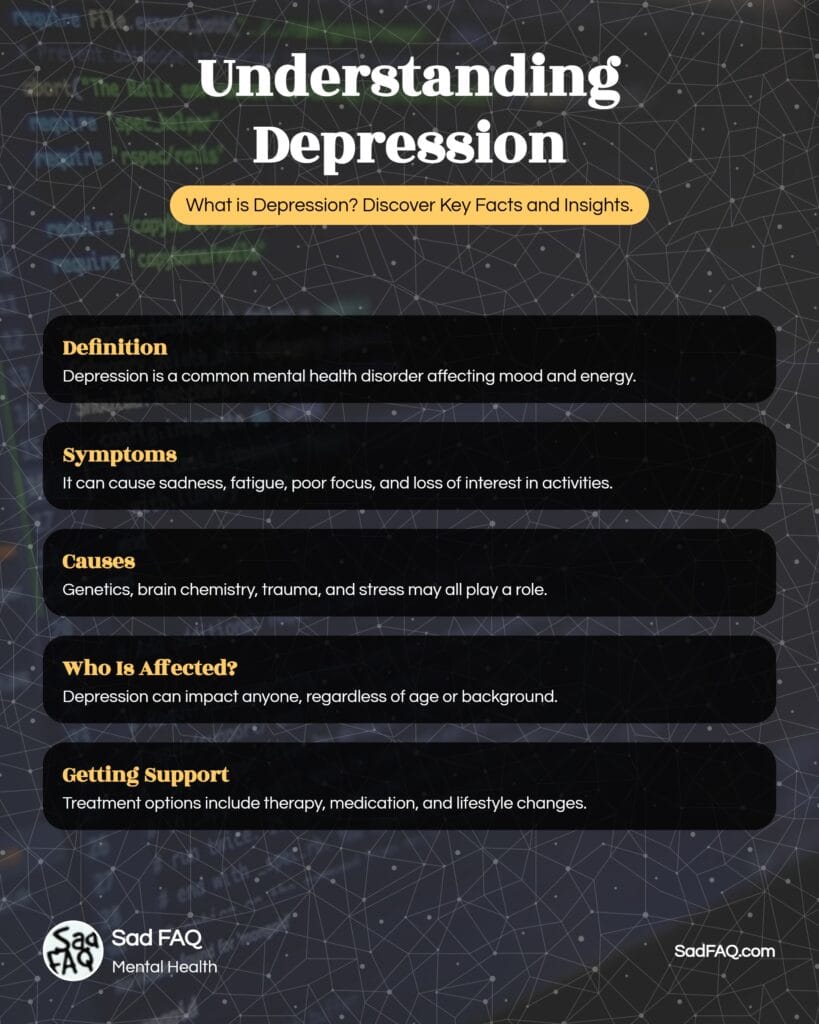
These are types of disorders that have what ties them together is their impact on daily life. In addition to major depressive disorder that is very demanding because of its intensity, understanding persistent depressive disorder can shed light on how chronic depressive feelings can slowly erode the person’s capacity for joy. At the same time, understanding seasonal affective disorder can be a reminder that our surroundings sometimes have a considerable influence on our mental health.
Therefore, whether it is handling those intense and rapid bursts of sadness associated with major depression or dealing with the quieter but still persistent shadows of dysthymia and SAD, it is crucial to recognize these differences to be able to find the right treatment that fits the individual. Anyway, the first half of the battle is knowing what you are dealing with – and who wouldn’t want to be victorious in this game called life?
Causes of Depression

Bananas contain tryptophan, which is a natural mood booster! So if you’re feeling down, you might want to consider having a banana instead of just staring at the wall. Just remember, eating too many could lead to an unexpected banana costume party when your friends show up!
“You may be disappointed if you fail, but you are doomed if you don’t try.” – Beverly Sills
Now, onto the million-dollar question: what causes depression? Well, it turns out there’s no single answer—it’s a cocktail made up of various factors! Genetics play a role; if someone in your family has struggled with depression, your chances increase too. It’s like inheriting Aunt Edna’s collection of ceramic frogs—only less cute and more complicated.
Life events also contribute significantly to the rollercoaster of emotions we all experience. Trauma, loss, or even significant changes can trigger depressive episodes in ways that feel like a sudden downpour on an otherwise sunny day. Have you ever had one of those weeks where everything seems to go wrong? You know the kind—your alarm doesn’t go off, you spill coffee on your favorite shirt, and then step in a puddle while rushing out the door. That kind of stress can pile up faster than dirty laundry! It’s like life is playing a practical joke on you, and unfortunately, it’s not just a fleeting moment; these accumulated stresses can weigh heavily on our mental well-being.
Diving into the Depths: What Causes Depression?
– Your Gut Has Feelings Too: Believe it or not, your stomach is more than just a food processor. It produces chemicals that affect your mood! If you’ve ever felt “butterflies” in your stomach when nervous, that’s because your gut and brain are in constant communication—like two friends texting each other about how they feel!
– The Weather Can Be a Downer: Ever heard of Seasonal Affective Disorder (SAD)? Some people get the blues when the sun hides away for too long. So if you find yourself feeling gloomy during winter, don’t worry; it’s not just you! Your body might be begging for some sunshine and vitamin D.
– Genetics Play a Role: Just like how some people inherit their grandmother’s knack for baking cookies, depression can run in families too. If someone in your family has struggled with it, you might be at risk. But don’t panic—it’s not a guarantee; think of it as having an extra set of genes to deal with!
Trauma is especially tricky. It could be something big, like losing a loved one or getting into an accident, but it doesn’t have to be. Sometimes it’s the little things, like a breakup or losing a job, that build up and make you feel bad. If we don’t thoroughly absorb these events, they can show up as depression later on. If you never take out the trash, your house will smell bad after a while. The same is true for our emotions: ignoring them only makes things worse.
Then there are the hormonal shifts that make things much more complicated. During their periods, women may have mood swings that make them feel like Superwoman one minute and cry over an old episode of “Friends” the next. Let’s speak about postpartum depression. After giving birth, a lot of women go through hormonal changes that are so strong that they feel like they’ve been tossed into a blender set to “chaos.” People with this kind of melancholy don’t simply feel sad; they also often feel like they’re not good enough or guilty for not bonding with their infant as intended.
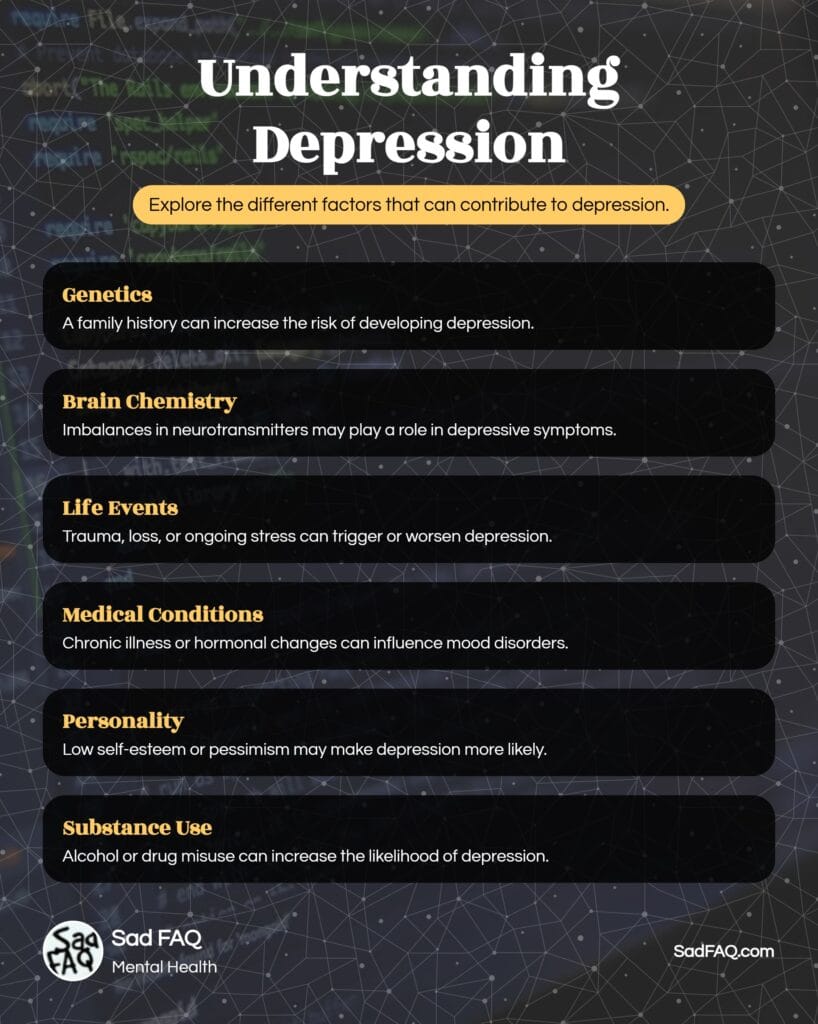
Knowing that the major events in our life are interconnected with our mental health is a better way to understand depression with compassion. Identifying trauma and drastic changes as legitimate triggers for depression gives us a sense that we are not isolated in this fight. It is quite common for a person to put up a good front and at the same time be dealing with some invisible struggles in their private space.
Luckily, recognizing the factors that influence our mood gives us more opportunities for support and recovery. Acknowledging what affects us is a prerequisite for taking a positive step forward be it talking through your experiences with friends or seeking professional help after a difficult life event. Life hits everyone with unexpected situations. We truly become different people by the way we respond to them (whether by catching them or deciding to let them pass)!
Recognizing Symptoms

Did you know that some people can experience “laughing depression”? This means they might appear happy and even laugh a lot, but inside, they’re feeling really sad. It’s like being a clown at a party while secretly wishing for the confetti to stop falling on your head!
“Sometimes the most productive thing you can do is relax.” – Mark Black
Recognizing the signs is very important because a lot of individuals suffer in quiet without knowing they are depressed. I mean, who hasn’t had days when they feel bad? But if these sensations last for weeks or months and make it hard to do everyday things, like forgetting how to enjoy pizza night, that’s when you need to pay attention.
The signs of depression can be as different as the toppings on a pizza, and believe me, they’re not always nice! Changes in appetite are one of the most obvious indications. You might grab late-night treats like they’re your best buddies, like an ice cream tub. It feels like your feelings have taken over your taste receptors, and you eat a whole bag of chips while watching a TV. Some people, on the other hand, lose their appetite completely, which can make meals feel like jobs instead of fun times.
Spotting the Signs: Recognizing Symptoms of Depression
– The Sneaky Sleep Thief: Did you know that depression can turn you into a sleep ninja? Some people sleep way too much, while others can’t catch a wink. It’s like your body is playing hide-and-seek with rest—except nobody’s winning!
– The Mystery of Missing Joy: Imagine loving pizza but suddenly feeling like it’s just a cardboard circle. That’s how depression can make you lose interest in things you once enjoyed. It’s like your favorite video game got stuck on the loading screen forever!
– Feeling Like a Zombie: If you’ve ever felt super tired even after a good night’s sleep, welcome to the club! Depression can zap your energy, making everyday tasks feel as hard as running a marathon in flip-flops. Who knew getting out of bed could be an Olympic sport?
Then there are problems with sleep. Do you ever wake up at 3 AM and wonder why socks are there? Come on! What are the reasons we have socks? It’s those strange ideas that come into our heads while we should be happily fantasizing of puppies or vacations in the tropics. Some people have trouble falling asleep and can’t seem to do it no matter how many sheep they count. Others may sleep too much yet still wake up feeling like they’ve run a marathon in their dreams. It’s hard to get things done throughout the day when you feel like a zombie, which makes sleep problems hard to deal with.
Another indicator that something is wrong is not having enough energy. You know how you feel when you’d prefer stay under a blanket than do even the slightest thing? Your body feels like it’s turned into molasses! Getting out of bed feels like a huge deal. Simple tasks become Herculean challenges, like determining whether to shower or simply go with the “I haven’t showered in three days” vibe.
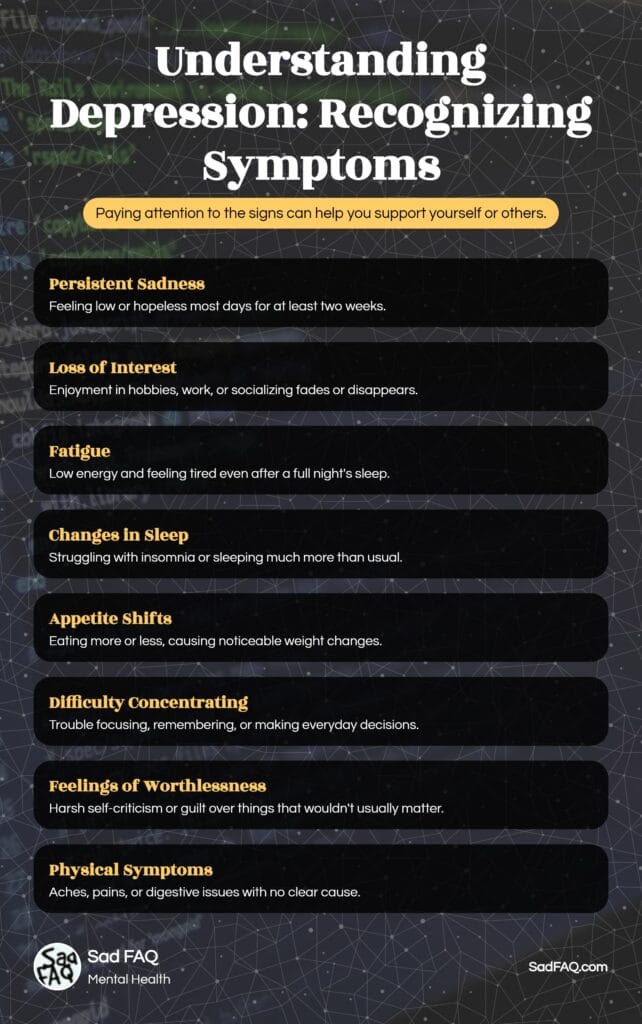
These symptoms often come with trouble focusing. Have you ever tried to read a book and then realized you had been staring at the same page for ten minutes without understanding anything? It’s really annoying! Your body is stuck in the actual world trying to figure out what day it is, but your mind is out on vacation somewhere sunny.
And then there are those annoying sensations of guilt or worthlessness that come out of nowhere. They say things like “You’re not good enough” or “Why can’t you just be happy?” These bad ideas can keep coming back and make it hard to see any hope at the end of the tunnel. If you have any of these symptoms and they linger longer than a few days, it might be a good idea to talk to someone who understands.
It’s not weak to ask for help; in fact, it’s one of the bravest things you can do! Talking to a friend who won’t judge you or getting expert help from a therapist can help you understand and recover. We all need help getting through the ups and downs of life, even when those downs feel like an elephant hanging on our shoulders!
The Importance of Seeking Help

Did you know that seeking help for depression can be as refreshing as getting a new haircut? Studies show that talking to someone about your feelings can lift your mood faster than a surprise pizza delivery! It’s like having a personal cheerleader who also brings snacks!
“You don’t have to be a genius or a visionary, or even a college graduate to be successful. You just need a framework and a dream.” – Michael Dell
Talking to someone, speaking of whichlet’s talk about the help you need! Absolutely no shame sticks to the act of reaching out for support when you feel that the gray clouds are hovering above you. Whether it’s talking to friends or family members or seeking professional help from therapists or counselorsthe important thing is not to go through this alone.
It is my view that we often undervalue the strength of talk; it is just like a window opening on a hot day. Imagine if you tell your story, that heavy load can be very significantly reduced! Almost a miracle is your doing when you breathe out your thoughts and feelings and they become less tempestuous for your mind and even recognizable. By which I mean like unravelling a tangled ball of yarn to get the whole design.
Asking for Help: It’s Not Just for Superheroes
– The Power of Talking: Did you know that just talking about your feelings can be like hitting a reset button on your brain? Sharing your worries with someone can make you feel lighter, kind of like letting go of a balloon—except this one won’t float away!
– Help is Like Wi-Fi: Think of seeking help like connecting to Wi-Fi. You might feel fine on your own, but when you connect, suddenly everything works better! Support from friends or professionals can boost your mood faster than finding out there’s free pizza at a party.
– Superheroes Need Sidekicks: Even Batman had Robin! No one expects you to fight the battles of life alone. Seeking help is not a sign of weakness; it’s more like teaming up with your own personal superhero squad ready to tackle depression together!
When you talk about your problems, whether it’s with a friend over coffee or in therapy, it makes room for understanding and connection. Have you ever noticed that stating something out loud makes it seem less scary? It’s like those words come to life and let other people understand and help. Also, it’s nice to know that you’re not the only one who feels that way. Everyone has their own problems, even if they don’t always express them.
Now, let’s talk about specialists. They have tools and methods that are made just for getting through these rough waters. They’re like life jackets for emotional shipwrecks! Therapists are educated to help us sort through our ideas and feelings in ways that often seem like magic. They provide you tools to assist you change the way you think when you’re feeling bad or to help you deal with problems when they get too much.
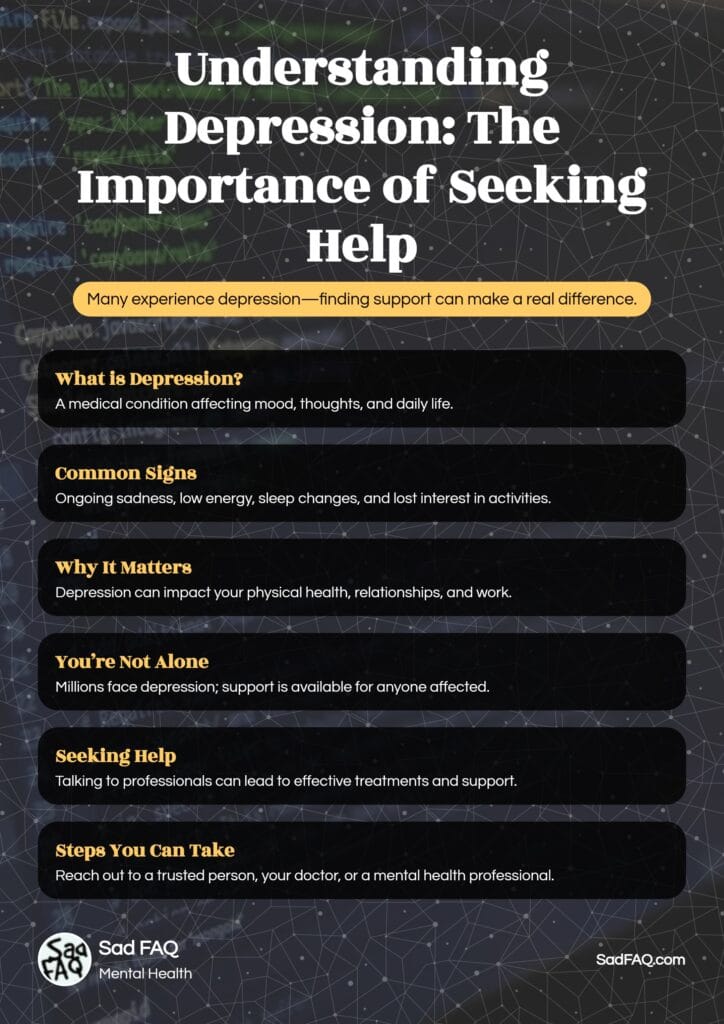
Cognitive-behavioral therapy (CBT) helps people find cognitive patterns that aren’t helping them and replace them with ones that are. It’s like having a toolbox full of emotional tools that can help you cure all kinds of mental problems. When negativity strikes, picture being able to pull out a wrench labeled “positive thinking.” Or, when you start to worry about the future, picture using pliers named “mindfulness” to hold on to the current moment.
Professionals also make safe places where you can say what you want without worrying about being judged. That privacy is quite important because it lets people to explore their feelings without worrying about what other people would think. Sometimes all it takes to feel better or see things more clearly is for someone to listen with compassion.
And don’t forget about group treatment! It can be quite validating to talk about your problems with people who really understand what you’re going through. It’s like finding your group of people in a world where everyone else seems to be alone. Participants can share tales, laugh at the silly things that happen to everyone, and even celebrate little wins, all while boosting one other up.
So, the next time you’re feeling overwhelmed by life’s problems, remember that talking to someone is not only useful, it’s necessary! Taking that step, whether it’s talking to friends or getting professional help, can make things better in the future—because honestly? We all need some sunshine now and again!
Coping Strategies
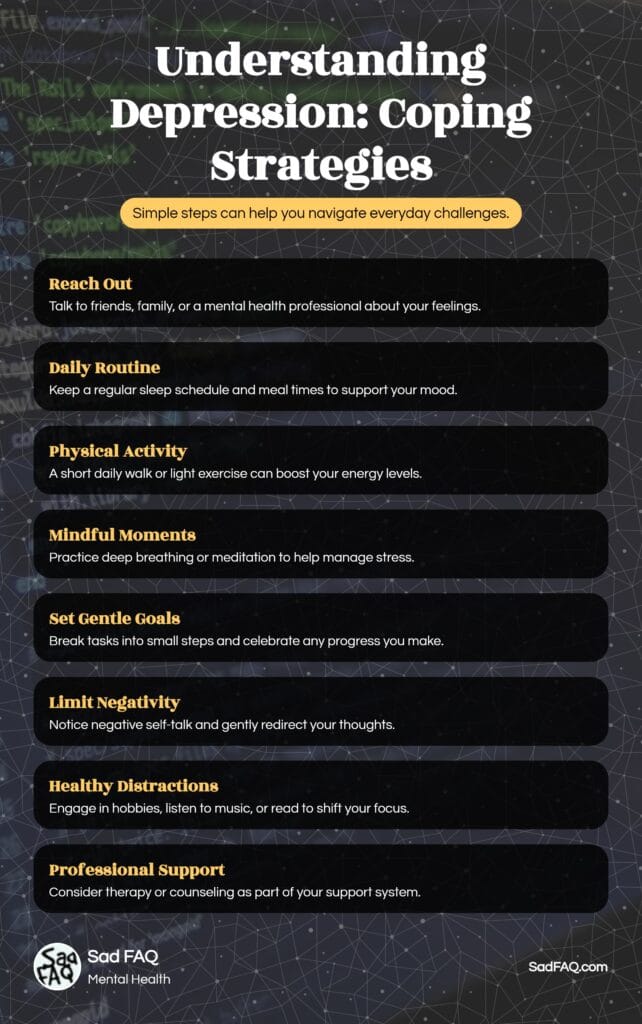
So, what do we do to deal with depression once we know we have it? There are a lot of options, thank goodness! One way to deal with turmoil is to set up routines. For example, rising up at the same time every day or taking ten minutes for breakfast can help you stay stable. uncovering an old favorite sweater buried deep in your closet is like uncovering a treasure.
Exercise is also great for your mood; it’s like a magic potion! Moving around, whether it’s dancing to your favorite songs in your living room or going for a leisurely walk outside (extra points if you see squirrels!), helps generate endorphins, which are the body’s natural mood boosters. Moving your body is really good for you in a lot of ways. I mean, have you ever just tried to shake it out? When you spin around and think you’re the star of a music video, it’s impossible to feel bad.
If you’re feeling down, try talking to your plants! Studies suggest that houseplants can thrive on positive vibes, and while they might not give great advice, at least they won’t judge you for binge-watching cat videos all day. Plus, it’s a low-pressure way to practice your conversation skills!
“I think the best way to get rid of your fears is to face them head-on.” – J.K. Rowling
It may seem foolish to dance in your pajamas, but I promise you it can be one of the most freeing things you can do. You don’t have to be a professional dancer to feel better; just letting go and appreciating the music can do the trick. You can also always say that it was an interpretative dance about the ups and downs of life if someone walks in on you. Art is subjective, right?
And then there are those nice, slow walks outside. Being in nature makes you feel better in some way. It’s like Mother Nature is hugging you as the sun warms your skin and the fresh air fills your lungs. And seeing squirrels? That’s just the frosting on the cake! Seeing them run around seeking for acorns or doing their little squirrel acrobatics may be quite fun. Who knew that little things could be so much fun?
Coping with Depression: Strategies That Work
– Laughter is Free Medicine: Did you know that laughing can boost your mood? Watching funny cat videos or silly movies releases feel-good chemicals in your brain. So, if you’re feeling down, grab some popcorn and a good comedy—it’s like a workout for your happiness!
– Nature’s Hug: Spending time outside can help chase away the blues! Just 20 minutes of fresh air and sunshine can lift your spirits. Think of it as nature giving you a big bear hug—without the actual bear part, which is probably for the best.
– Dance Like No One’s Watching: Dancing around your living room is not just fun; it’s also a great way to cope! Whether you’re busting out moves from the ’80s or doing the robot, shaking it out can release stress and make you feel fabulous—even if your dog thinks you’re ridiculous!
You don’t have to work out hard for it to be good for you. Even small movements matter! Doing basic workouts like stretching at home will help you get rid of tiredness and raise your energy levels. In fact, some people say that simply 10 minutes of moving around may make a big difference in how they feel all day.
Mindfulness activities are another great approach to fight off bad feelings, so let’s talk about them now. Meditation and yoga are two examples of techniques that help people stay in the present instead of becoming lost in negative thoughts. It’s like clicking pause on a part in a movie that is too much for you. Have you ever seen a movie when everything seems out of control and stressful? When you hit pause, you can take a break and get your bearings before jumping back into the action.
The goal of meditation is to discover peace within yourself in the middle of all the craziness of life. Imagine sitting still with your eyes closed and only focusing on your breath while letting go of everything else. Sounds pleasant, doesn’t it? It could take some practice (and maybe a few times when your mind wanders off like pups chasing butterflies), but this practice will lower your stress levels a lot over time.
Yoga is a great way to combine exercise and contemplation. Each stance makes you more conscious of how your body feels right now, like giving yourself permission to slow down and check in with what’s going on within. Also, who doesn’t like feeling all flexible after? It’s almost as wonderful as eating a warm cookie right out of the oven!
You don’t have to spend hours every day doing these things; even short sessions can be quite helpful! Every little bit helps make you happier, whether it’s five minutes of stretching in the morning or ten minutes of meditation before bed.
So keep this in mind: whether you’re playing music alone at home or finding peace through mindful practices, it’s important to take care of both your body and mind if you want to get rid of those annoying clouds that are blocking your bright mood!
Building Support Networks
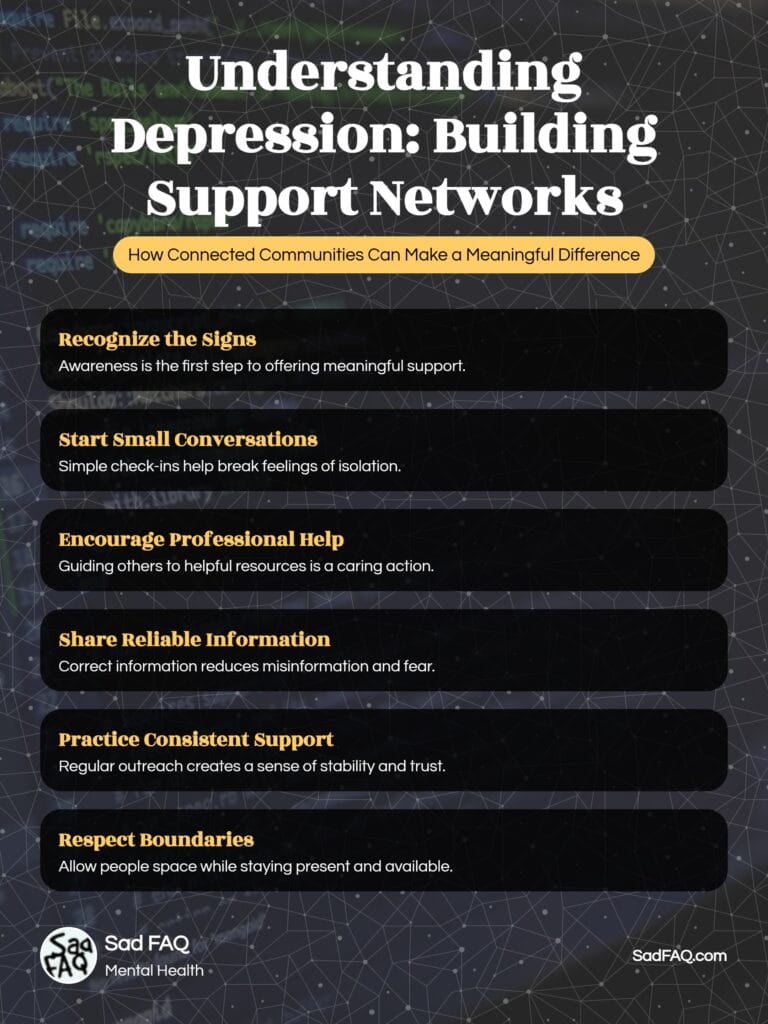
We definitely should not overlook the importance of constructing support networks! Interacting with loved ones, whether face-to-face or online, is an essential activity to perform in difficult moments because it gives us a feeling that we are not isolated. When we share a laugh over ridiculous memes or talk our difficulties through, we create relationships that encourage us when we are down.
Building Your Support Squad: Fun Facts
– Friendship is Like a Superpower: Having friends can actually help you live longer! Studies show that strong social connections can reduce stress and even boost your immune system. So, gather your pals—it’s like assembling the Avengers, but with less spandex!
– Pet Power: Did you know that pets can be amazing support buddies? Just petting a dog or cat can release oxytocin in your brain, which makes you feel happier. It’s like having a furry therapist who doesn’t charge by the hour!
– Talk it Out: Sharing your feelings can lighten your load. Talking to someone about what you’re going through is like unloading a heavy backpack filled with rocks. The more you share, the lighter it gets—just don’t forget to pack some snacks for the journey!
Support groups are another fantastic choice since people can talk about their problems without being judged. It’s a secure place with people who really understand what you’re going through. You’d be shocked how much better it feels to hear that other people are going through the same things. Those invisible backpacks don’t seem so heavy anymore!
To understand depression, you need to know how complicated it is, from its causes and symptoms to the ways people deal with it and the support systems that are accessible today. By talking about this condition that people often get wrong and maybe even making each other smile, we can learn to be kind to ourselves and those who are going through the same things!
Suggested Resources
Understanding Depression
https://www.nami.org/About-Mental-Illness/Mental-Health-Conditions/Depression
The Mighty: Living With Depression
https://themighty.com/topic/depression
HelpGuide: Understanding Depression
https://www.helpguide.org/articles/depression/understanding-depression.htm
Frequently Asked Questions
What is depression and how does it affect daily life?
Depression is a mental health condition that impacts thoughts, emotions, and daily functioning. It can cause persistent sadness, low energy, irritability, and difficulty completing routine tasks.
What are the main types of depression?
Common types include major depressive disorder, persistent depressive disorder, and seasonal affective disorder. Each affects mood and daily life differently in intensity and duration.
What causes depression?
Depression can result from genetics, trauma, stress, hormonal changes, and environmental factors. Often, multiple influences work together to trigger symptoms.
What symptoms should people look out for?
Symptoms may include fatigue, changes in sleep, loss of interest, appetite changes, trouble concentrating, or persistent feelings of guilt or hopelessness.
When should someone seek help for depression?
If symptoms last for weeks, interfere with daily life, or feel overwhelming, seeking support from friends, family, or mental health professionals is recommended.
What coping strategies can help manage depression?
Helpful strategies include exercise, mindfulness, nature walks, creative expression, and maintaining routines. These small actions can improve mood and reduce stress.
How do support networks help with depression?
Support networks provide connection, encouragement, and understanding. Talking with friends, support groups, or loved ones can reduce isolation and improve emotional well-being.

Kevin Collier is a passionate mental health advocate and writer for SadFAQ.com, where he explores the complexities of depression and mental well-being. With a deep understanding of mental health challenges, Kevin provides compassionate insights and practical advice to help individuals navigate their journeys toward healing. His articles aim to destigmatize mental health issues, offering support and resources for those seeking to improve their emotional resilience. Committed to raising awareness and fostering open conversations, Kevin’s work empowers readers to prioritize their mental health and seek the support they deserve.


